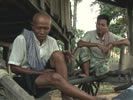Eye For Film >> Movies >> Enemies Of The People (2010) Film Review
Documentary as a form of cinema is something I grapple with more than embrace. While I admire its decision to seek the greater truth beneath the protective buffer of fiction that most narrative film offers, it is something akin to a surgeon seeking to cure by peeling away the very layers that protect us from harm. Who are we handing truth over to when a filmmaker calls himself a documentarian? Do we presume these men and women to be fair arbiters of this truth? Or are they in fact manipulators, driven by ego and fame rather than any egalitarian motivation.
It was with great trepidation then, that I sat down to watch Enemies Of The People. A collaboration between Thet Sambath, a respected Cambodian investigative reporter, and British documentarian Rob Lemkin. It tells of Thet’s decade-long quest into the jungles at the heart of the Khmer Rouge’s brutal regime and his attempts to understand why it led to the deaths of his family and so many others.

Sensitive material even if we had had a deep understanding of the events during the bloody four-year reign of Pol Pot and his second-in-command Nuon Chea, the focus of this film, and better known as Brother Number Two. But we don’t. Only until recently has the Khmer Rouge even been a part of the syllabus in Cambodian schools. As any visitor to this noble country will tell you, this is a proud and welcoming people, not one cowed by the terrors of history. At least, not on the outside.
This film is not proselytising brought on by grief or anger or rage. The emotions you might expect to see are kept inside, replaced by Thet’s matter-of-fact tone and a line of questioning that is more conversational than interrogative. These are not sterile interviews in the newspaper offices. They’re conducted at a table, as Nuon Chea bounces a baby on his lap, or on the bamboo floors of the homes of ex-party soldiers, once farmers, but forced by party ideology into becoming killers.
While Thet confronts the Khmer Rouge, Lemkin turns his camera on Thet, who reveals that his investigation was based on a lie: establishing a relationship with Nuon Chea on purely journalistic grounds rather than any personal motivation. His work meant leaving his family for long stretches and yet it’s this lie that gives Thet the most guilt. When should he reveal the truth? How will Nuon Chea react? Along with the impending date of the tribunal set-up to try members of the Khmer Rouge, it brings some kind of structure to events that unfold like sifted, sickly memories.
Men who once had to hide their emotions for fear of suspicion, now giggle nervously as they are asked to act out slicing a victim’s neck. Firelight glints off water as killers confess to drinking from human gall bladders and recalling the last face on the last person they killed. Thet greets them all with the customary title of ‘Uncle’ or ‘Auntie’, as if they were members of an extended family, and not, potentially, the people who murdered his father, mother or brother.
The film even takes you through one of the infamous Killing Fields - the sounds of farming and nature falling away to an eerie, green calm. For a moment there is a even a sense of bucolic serenity. But as each interview shows, beneath the once fecund soil lie the decomposing bodies of thousands of Cambodians identified as the eponymous enemies of the people. This juxtaposition of natural cycle and human genocide is subtly and deeply conveyed.
Through all this, no matter what events are being described, Thet’s composure never wavers. He just adds new film to the cameras with the same click-clack punctuation of a magazine loaded into a gun. Each tape recording he carefully locks away in a box in his home signifies another level of what can only be described as a friendship with Nuon Chea. One that evinces a range of emotions, from trepidation when he finally reveals his secret, and a strange sadness when Chea is taken away for trial. The same man who, in one scene, equates people with infection, and in another, sits proudly at the head of a large family, much like the one Thet lost years ago and the one he risks now in his search for truth. Abhorrent you might think. But it’s exactly what makes the film so thought-provoking.
Reviewed on: 11 Mar 2010

















